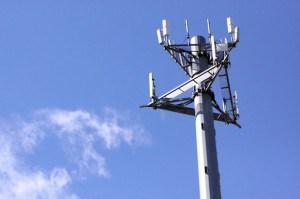Pro-broadband reform groups continue to hit the telecommunications industry’s last nerve. While the fight for more expansive broadband and Net Neutrality continues, some providers and their water-carrying friends are pulling out all the stops to keep broadband under the firm grasp of a phone and cable duopoly. Both will say or do just about anything along the way to stop consumer-friendly reform.
Say hello to Mike Wendy. He’s made it his personal mission to “expose” groups promoting broadband reform as “radicals” and “hardcore entrenched lobbyists.” Using rhetoric that will resonate with angry talk radio listeners, Wendy is convinced broadband policies that enforce the public interest and Net Neutrality are akin to a Marxist takeover. While Wendy calls on good Americans like himself to man the barricades protecting AT&T, Verizon, Comcast, and Time Warner Cable, he just doesn’t have time to mention he happens to work for a special interest group funded by Big Telecom. Maybe it slipped his mind?
Wendy’s ironically named “Media Freedom” blog is chock full of attacks on “Free Press and the radical media reformistas [sic].” Special guest stars include Venezuela’s Hugo Chavez, Marxism, collectivism, and a whole slew of rhetoric that ultimately tells readers efforts to enact broadband reform are little more than a grand socialist conspiracy.

A real grassroots campaign is run for and by consumers. An astroturf campaign is bought and paid for by corporate interests to push their own agenda.
His visitors’ enthusiasm for such accusations might be diminished a tad had Wendy prominently disclosed his day job: Vice President of Press & External Affairs at the Progress & Freedom Foundation, a “think tank” that ingests money from Big Telecom and then spews forth their talking points. Among the backers: AT&T, Comcast, the National Cable and Telecommunications Association, Time Warner Cable and Verizon.
That takes the wind out of the proclamation that Media Freedom is a bulwark against those who “threaten to quash speech and economic freedoms.” Wendy isn’t working for Big Government. He’s working for the interests of AT&T and Comcast.
Many of the companies supporting the Progress & Freedom Foundation have a vested interest in maintaining today’s barely-competitive broadband marketplace, avoid oversight, and stop reform regulation and legislation dead in its tracks. They want Progress only on their terms and the Freedom to do whatever they please.
The real chutzpah moment came when Wendy claimed pro-consumer groups like Free Press and Public Knowledge were the ones running high-powered lobbying campaigns. That’s a pot to kettle moment to behold, especially considering who paid to print Wendy’s business cards. From a recent blog post:
The “public interest” lobby makes itself out to be the tireless, country-poor underdog for the downtrodden consumer. But don’t be fooled. In the technology space, three such groups – Public Knowledge, Media Access Project and Free Press – have few rivals. Their humble appearance belies their take-no-prisoners, oftentimes shameless, below-the-belt approach to public policy formation and gamesmanship. How do they do it? They use all the tools, and then some, to make them every bit as sophisticated as the largest companies they’re trying to undermine.
Shameless and “below-the-belt” might better define Wendy’s last job: “Director of Grassroots” for the United States Telecom Association, a job title that literally defines astroturf-in-action. Who is on the board of USTA? Among others, corporate executives and lobbyists for AT&T, Verizon, Qwest, and two members who shouldn’t be able to afford the annual dues considering their employers went bankrupt — Hawaiian Telcom and FairPoint Communications.
Wendy’s line of thinking is evident soon enough from his blog’s tag cloud, a regular cocktail of conspiracy:

The ironically named "Media Freedom" blog isn't media and its freedom is limited to carrying water for the nation's largest telecom companies.
- Al Franken (the broadband industry’s ‘Boogie Man’)
- Cyber-Collectivist (the secret link between broadband and Jean-Jacques Rousseau)
- Fairness Doctrine (guaranteed to perk up the ears of any conservative talk radio fan wandering through)
- First Amendment (for corporations)
- Freedom (for said corporations to abuse your wallet)
- Free Speech (for corporations)
- Hugo Chavez (the go-to-guy for lazy smear-by-association rhetoric)
- Marxist (chalkboard time)
- New Deal (broadband users sure want one)
- … and redistributionism (something overheard at the last session of the “Communications Comintern?”)
The rhetoric is two parts AT&T to one part 1970s Radio Tirana, Albania. A Glenn Beck swizzle stick labeled “Marxism” is included to stir the overheated rhetoric into a hot mess for Verizon and the cable lobby.
All of the “isms” aside, we’ve created a convenient, handy-dandy chart you can use to see which team Wendy and his group really supports:
Distinctions With a Difference – A Telecommunications Issue Checklist
| Issue | Reform Groups | Big Telecom | “Media Freedom” |
|---|---|---|---|
| Universal Service Mandate – Service for Everyone At a Fair Price | Favor | Oppose | Oppose |
| Speed Throttles/Network Management That Favors Premium Content | Oppose | Favor | Favor |
| Net Neutrality | Favor | Oppose | Oppose |
| Reduce Concentrated Ownership of Media/Telecom | Favor | Oppose | Oppose |
| Allow Cable Customers to Pick, Choose, and Pay for Their Own Channels | Favor | Oppose | Oppose |
| Public Interest Mandates for Local Radio & Television | Favor | Oppose | Oppose |
| Usage Limits/Internet Overcharging | Mostly Oppose | Favor | Favor |


 Subscribe
Subscribe







